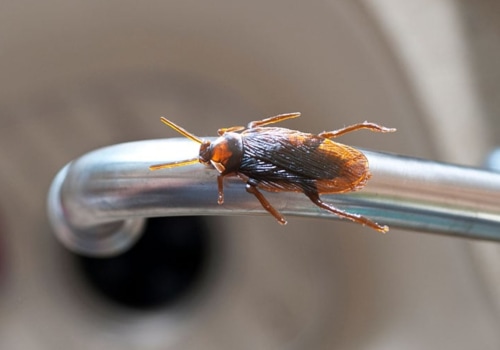Outdoor pest control in Orlando presents unique challenges for homeowners. Local exterminators have identified key strategies and solutions tailored to the region's diverse pest landscape. Understanding how to identify pests and implement effective management techniques is crucial. This guide offers practical advice, from DIY methods to professional interventions. Yet, the question remains: how can residents best protect their homes while fostering a pest-free environment?
Understanding Outdoor Pests In Orlando
In Orlando, a diverse range of outdoor pests can pose significant challenges for homeowners and residents. Common outdoor pests in the area include mosquitoes, ants, termites, and rodents, each presenting unique challenges that can impact comfort and property. Understanding the characteristics of these pests is crucial for effective management.
Pest identification tips are essential for recognizing the signs of an infestation. Homeowners should look for specific indicators, such as droppings, nests, or damaged plants, which can signal the presence of particular pests. For example, the sight of small, discarded wings may point to a termite issue, while a trail of ants can lead to their nest. By becoming familiar with these common outdoor pests and employing effective pest identification tips, residents can take proactive measures to safeguard their homes and maintain a pest-free environment.
Effective DIY Pest Control Solutions
While many homeowners may feel overwhelmed by the presence of outdoor pests, effective DIY pest control solutions can empower them to manage these challenges independently. One of the first steps is to utilize pest identification techniques to determine the specific pest species invading the property accurately. This knowledge is crucial, as different pests require different control methods.
Once identified, homeowners can employ various eco-friendly sprays, which are not only effective but also safe for the environment and pets. Common ingredients for these sprays include vinegar, essential oils, and diatomaceous earth. Additionally, regular maintenance practices, such as sealing entry points, removing standing water, and keeping gardens tidy, can significantly deter pests from returning. By embracing these DIY strategies, homeowners can take proactive measures to protect their outdoor spaces against pests, ensuring a more pleasant outdoor environment.
When To Call A Professional Exterminator
Recognizing the limits of DIY pest control is important for homeowners facing persistent pest issues. When signs of infestations become evident, such as increased pest activity, property damage, or health concerns, it may be time to seek professional help. Homeowners should not hesitate to call a professional exterminator if their attempts to manage the situation have failed. When selecting exterminators, it is essential to consider their experience, methods, and customer reviews to ensure an effective service. Additionally, certain pests, such as termites or bed bugs, require specialized treatment that can only be provided by professionals. If the infestation is extensive or poses health risks, enlisting expert assistance is essential for a thorough resolution. Ultimately, understanding when to call for professional help can save homeowners time, money, and further complications in their pest control efforts. If you are searching for "pest exterminator near me" online, be sure to check out Forest Pest Control.
Natural Remedies For Pest Prevention
How can homeowners effectively prevent pests without resorting to harsh chemicals? Many individuals are turning to natural remedies, finding them both effective and environmentally friendly. Herbal repellents, such as neem, peppermint, and rosemary, can deter common pests when applied around the home. These plants possess properties that make them unappealing to insects and rodents, providing a safe alternative to synthetic pesticides.
Essential oils also play a significant role in pest prevention. Oils such as lavender, tea tree, and eucalyptus can be diluted with water and sprayed in vulnerable areas. The strong scents of these oils act as deterrents, keeping pests at bay without harmful side effects. Additionally, methods such as maintaining a clean environment and sealing entry points enhance the effectiveness of these natural solutions. By incorporating herbal repellents and essential oils into their pest prevention strategies, homeowners can create a healthier living space while successfully managing pest issues.
Seasonal Pest Control Tips
As the seasons change, homeowners must adapt their pest control strategies to effectively manage the varying threats posed by different pests throughout the year. Understanding seasonal patterns is crucial for anticipating pest migration, which can significantly impact home environments.
During spring, homeowners should be vigilant against ants and termites as they become more active, searching for food and nesting sites. In summer, mosquitoes and ticks thrive, requiring regular treatments to minimize their presence. Fall often brings rodents seeking warmth, prompting the need for effective sealing of entry points.
As winter approaches, pests may hibernate or seek shelter indoors, making it essential to maintain preventive measures. Regular inspections and targeted treatments aligned with these seasonal patterns can help prevent infestations. Homeowners are advised to consult local exterminators for tailored strategies to ensure comprehensive pest management throughout the year.
Maintaining A Pest-Free Garden
To maintain a pest-free garden, homeowners must implement a combination of proactive strategies and ongoing monitoring. One effective method is companion planting, which involves pairing plants that naturally deter pests with those susceptible to them. For example, marigolds can repel nematodes while attracting beneficial insects. This approach not only enhances biodiversity but also promotes a balanced ecosystem.
Additionally, maintaining optimal soil health is crucial. Healthy soil supports robust plant growth, making them less vulnerable to pests. Regularly amending soil with organic matter and ensuring proper drainage can foster a thriving garden environment.
Monitoring for signs of pest activity, such as unusual leaf damage or droppings, is essential. Early detection allows for swift intervention, whether through manual removal or natural remedies. By combining companion planting with a commitment to soil health, homeowners can enjoy a flourishing garden while minimizing the risk of pest infestations.
Landscaping Choices That Deter Pests
Choosing the right landscaping elements can significantly reduce pest problems in residential areas. Utilizing native plants is one effective strategy, as these species are well-adapted to the local climate and require less maintenance, making them less inviting to pests. Furthermore, native plants often support beneficial insects, which can help control pest populations naturally.
Incorporating pest-resistant flowers into the landscape design is another excellent choice. Varieties such as marigolds and lavender not only add beauty but also deter common pests like aphids and mosquitoes. By strategically placing these plants throughout the yard, homeowners can create a natural barrier against unwanted invaders.
Additionally, maintaining a diverse planting scheme helps to disrupt pest life cycles, making it harder for them to establish themselves. Overall, thoughtful landscaping choices can play a vital role in minimizing pest issues and promoting a healthier and more enjoyable outdoor environment.
Protecting Your Home From Outdoor Pests
Effective landscaping choices can greatly enhance the overall defense against outdoor pests, but additional measures are necessary to safeguard homes. Homeowners should prioritize home maintenance strategies to create a barrier against pests. Regularly inspecting the property for cracks and gaps in walls, windows, and doors can prevent unwanted entry. Utilizing pest identification techniques is crucial; recognizing signs of infestations early allows for timely interventions.
Moreover, ensuring that gutters are clear and downspouts direct water away from the foundation can deter moisture-loving pests. Keeping vegetation trimmed and away from the structure minimizes potential nesting sites for birds. Additionally, storing firewood and compost away from the home reduces the attraction for pests. By combining these strategic home maintenance approaches with effective landscaping, homeowners can significantly reduce the risk of outdoor pests infiltrating their living spaces, ultimately fostering a safer and more comfortable environment.
Contact A Reliable Pest Control Service In Orlando
Outdoor pest control in Orlando isn’t just about comfort—it’s essential for protecting your home, family, and outdoor spaces from the unique challenges of Florida’s warm, humid climate. From mosquitoes and ants to rodents and termites, staying proactive with professional strategies can make all the difference. With expert tips from local exterminators, you now have the tools to prevent infestations before they become costly problems. Whether you're dealing with a current pest issue or want to safeguard your property year-round, partnering with a trusted local service ensures peace of mind and long-lasting results.
Contact Forest Pest Control in Orlando today to take the first step toward a pest-free outdoor environment.







